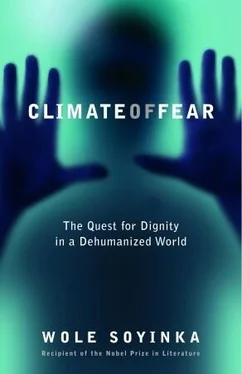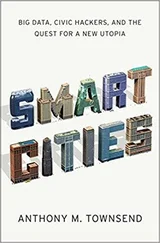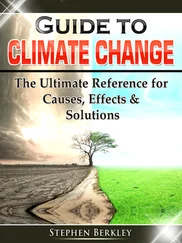After a predictable pulverization of a nonranked pugilist, Tyson embarked on his familiar bout of obscenities, but in a language that, even by his standards, shocked his listeners in the lurid portrayal of his demolition plans for his next opponent, Lennox Lewis, for whom he appeared to have conceived a singular hatred. I wrote:
How… does one interpret the act of bombing Yasser Arafat’s offices? We appear to have been spared the horror of the direct bombing of his residence but, for several moments, that insensate outrage did appear to have taken place — according to one of the early newscasts. Fortunately, it dropped out of the reportage. Nonetheless, confirmation has since followed that a rocket did land within yards of his residential compound, and that the quarters of his bodyguards were demolished. The attacks began even while the UN secretary-general’s envoy, Roed-Larsen, was actually in Mr. Arafat’s offices…
The tactics of cutting off electricity, telephones, water, and of course radio transmission around the city of Ramallah, blocking all exits and entrances to and from the city, joined in reinforcing a pugilist’s tactics of asphyxiation — working the ring methodically, reducing an opponent to a gradually diminishing space of mobility and oxygen, then zooming in for the kill. Kofi Annan was somewhere around, his intermediary was shuttling between the belligerents. I permitted myself the hope that this United Nations presence would be sufficient to restrain Israel from going any further.
Such optimism was swiftly punished. The gun-ships returned to the attack and, this time, the assault on the headquarters of Yasser Arafat in Ramallah was followed by further attacks in Gaza. Then the radio station was hit. Then other police training stations, the marine corps, Palestinian Authority buildings, etc. The nerve centers of Arafat’s makeshift authority were being systematically destroyed. Barak… was tearing out Arafat’s heart, liver, and tongue — and feeding it to his children, and his children’s children, the heirs of an unremitting hatred that will brand them from infancy and drive the hopes of peace in the Middle East beyond the horizons of generations yet unborn. [Italicized words courtesy of Mike Tyson.]
It is becoming impossible to recall a time when death visited this field of incompatibilities in single digits. Let us bear that in mind as we recall the response of Israel’s main backer, the United States, to the escalation of this belligerence, so rooted in disdain that it literally bared an opponent, a beleaguered leader of his people, of all the rags of authority — reverting to our language of conflict bargaining — and left him not a stitch to cover his nudity. Madeleine Albright, then secretary of state, read a statement on behalf of the U.S. government that failed to recall the deaths of Palestinians, failed to share with the world any thought of regret for their deaths, even as she mourned and commiserated with the Israeli government on the deaths of two of its soldiers. Such unstatesmanlike insensitivity, such a crass lacuna in the history of global relationships, which was justly and bitterly seized upon by the secretary-general of the Arab League, reinforced the glaring question mark on the claims of the United States to be an evenhanded partner for peace with the rest of the world.
My mind often returns to that act of global contempt in the Israeli-Palestinian conflict — an attack on the headquarters of Yasser Arafat that began even while the UN secretary-general’s envoy, Roed-Larsen, was physically in Arafat’s office! The secretary-general and his other envoys were also within Palestine — in short, this assault took place right under the nose of the United Nations. If nothing else, that incident must have completed the ongoing erosion of the confidence of a large, interlocking Community — the Arab and the Islamic — in an impartial and authoritative intervention from the world organization in which the global community has placed the mechanisms of arbitration. If we have to look for defining moments of despair and desperation within the Community that embraces the Palestinian people, its consciousness of the disdainful dismissal of its worth in international opinion, this surely must rank as one of the foremost — and there have been, alas, uncountable numbers.
Dignity is simply another face of freedom, and thus the obverse of power and domination, that axis of human relationship that is equally sustained by fear — its poles doomed to remain in permanent conflict, yet complement each other. I shall expand on an experience that I described in the first of this series—“A Changing Mask of Fear”—where I commented on the emotional state of my neighbors when we were confronted by a raging fire that threatened to consume our homes, and indeed cast doubts on our very survival if we hesitated a moment too long in its path. I offered a contrast in the feeling of helplessness that one obtains when Nature herself is the force of domination, as opposed to when any human, an equal of others in most ways, takes on the role of dominator or dispenser of life and death, and robs one of the faculty of volition. We need such reminders from time to time to ward off the supercilious cant of those — mostly the purveyors of terror, state or quasi-state, and the vicarious undertakers of human wastage — who wave off human trauma with some profound logic that is presumably embedded in comments such as “After all, one sudden earthquake or flood kills more people than even a year-long civil conflict in Liberia or Chechnya.” Neither death nor su fering is at issue.
To return, then, to that California experience: I observed no sense of reduction in self-esteem, no conduct that equated with indignity, despite the fact that we were impotent in face of this assailant. This was Nature at work, impersonal, and with an awesome power that annihilated all that lay before it. The power that is exerted by Nature does not humiliate. Indeed, not even the daily precarious habitation in the shadow of a rumbling volcano such as Mount Etna, which in recent decades sent the inhabitants scurrying yet again for safety, nor the earthquakes that devastated parts of Turkey, and lately Iran — none of these remotely attains the reduction of individual self-worth as does the condition of arbitrary control by another. Those citizens of California who live along the San Andreas fault, that is, live with the consciousness of arbitrary seismic eruption, are unfazed by the possibility of death whenever the earth decides to challenge their rights of occupancy. In the Caribbean, the islanders are inured to hurricanes and the accompanying floods. Mud slides occasionally wipe out ancient habitations and bury thousands, later to be dug up in grotesque shapes of mortality — inhabitants of the Philippines recently joined the ranks of these entombed casualties. None of these victims, however, can be said to exist in fear of humiliation or loss of dignity. Illustrations of the kind of power that reduces our self-worth range from the most mundane, even domestic relationships — such as a tenant’s fear of ejection by a landlord in a system that offers neither preventive measures nor legal redress — to a wife or child subjected to constant physical and mental abuse by a husband or parent, an Irish teenager in the grip of terror of a vigilante committee, or a Zimbabwean recruit in the burgeoning terror training camps of a Robert Mugabe, where some are raped as a mandatory rite of induction.
The nature of power that humbles and humiliates is that which compels the head of a Palestinian family to sit helplessly under Israeli guns, drenched in tears, as he watches his ancestral olive grove, the sole family source of livelihood, fall under the electric saw, tree by tree, to make way for the very wall that will, from then on, reduce his space of volition. Or else wake up suddenly in the middle of the night to find strangers in your bedroom… a battering ram has knocked a huge hole in your wall, and a group of armed men are hustling you, your wife, and your children into a holding pen — such experiences must rank as the ultimate erosion of one’s self-esteem. The diet of the average Palestinian in the Middle East today — for this is where we are headed— the table fare of the average citizen is that forced diet of indignity that even children swallow daily and, worse still, watch their parents undergo, encounters that denigrate their very humanity. The reality of this territory of collective indignity can be studied closely by anyone who can make the pilgrimage — one that is attested as unbearable by United Nations agencies on the ground, by humanitarian groups that are constantly involved and find themselves sometimes at risk — to a zone that is at the very heart of today’s climate of fear.
Читать дальше












